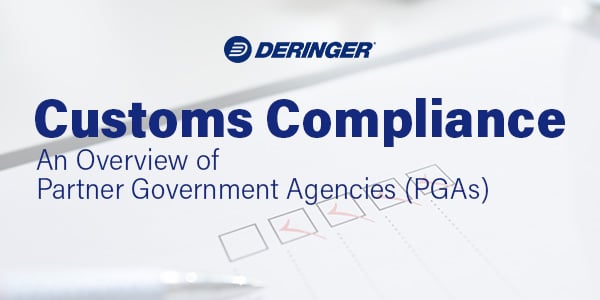
Importing into the U.S. involves a long list of tasks and careful considerations. There’s no worse scenario than thinking you’ve dotted all your Is and crossed all your Ts, only to realize you overlooked a PGA regulation and your shipment cannot get through Customs.
Before importing goods into the U.S., it’s vital to know whether they fall under the purview of any U.S. government agencies that maintain regulatory responsibilities over imports and exports. These agencies can place a hold on your shipment if they have reason to believe it isn’t compliant with their regulations. Monetary penalties, increased inspections, and cargo delays can arise as a result.
What is a PGA?
A PGA (Partner Government Agency) is a division of the federal government that regulates specific products imported into the U.S., along with Customs. Once known as OGA (other government agencies), the term describes government regulatory agencies that assist Customs in evaluating imported goods. Approximately 50 PGAs are regulating specific products entering the U.S. Some notable PGAs include:
- National Highway Traffic and Safety Administration (NHTSA)
- Environmental Protection Agency (EPA)
- Food and Drug Administration (FDA)
- United States Department of Agriculture (USDA)
- Animal Plant Health Inspection Service (APHIS)
- Consumer Product Safety Commission (CPSC)
- Fish and Wildlife Service (FWS)
- Department of Commerce (DOC)
The agency’s overall goal determines the goods regulated by each PGA. For instance, the USDA regulates meat products, and the FDA regulates food and drug manufacturing, storage, shipping, and Customs clearance of food and drugs. APHIS examines goods that might bring in pests and the DOC checks for antidumping and countervailing.
The products regulated by PGAs may require permits or additional information upon entry. Each PGA maintains an import/export guide to inform you of these requirements. Customs verifies the acquisition of required permits and documentation on behalf of each PGA.
Importers must research commodities for PGA requirements before ordering goods from foreign suppliers and should know which ones fall under multiple PGAs.
Remember, PGA requirements are based on commodities, not Harmonized Tariff Schedules (HTS) numbers. Many PGAs offer guidance by flagging HTS numbers whenever a commodity classified under a specific HTS falls under their jurisdiction.
Key PGA Players to Know
Though this is not an exhaustive list, there are some key PGA players you should know.
Department of Health and Human Services (HHS)
Regulates
Dangerous chemicals, food, medications, and anything else that could potentially harm the health of individuals or large populations.
HHS Agencies
- Food and Drug Administration (FDA): Regulates food, medical products, cosmetics, tobacco, and electronic devices. All products must be properly labeled and allowed to enter through the U.S. border. Questionable goods that do not follow FDA rules are immediately destroyed.
- Center for Disease Control and Prevention (CDC): Regulates infectious biological agents, materials known to contain an infectious biological agent, and animals known to carry diseases transmittable to humans. To import these commodities requires a CDC permit, granted if the commodities comply with all CDC regulations.
Department of Agriculture (USDA)
Regulates
Agricultural products and live organisms.
USDA Agencies
- Food Safety and Inspection Service (FSIS): Regulates all meat, poultry, and egg products imported from other countries to ensure they meet the same scrutiny and regulations as domestic products. FSIS workers inspect all meat, poultry, and egg products at the port of entry as an added layer of security, even if they come from an FSIS verified supplier.
- The Agricultural Marketing Service (AMS): Regulates labels on agricultural products and provides mandatory labeling requirements for products. Also inspects and grades imported produce. See USDA Ag and Marketing Section 8e requirements.
- Animal and Plant Health Inspection Service (APHIS): Regulates animal care, veterinary services, biotech regulatory services, plant protection, and quarantine. Produce, wood, soil, animals, and other agricultural commodities must be examined and potentially treated to prevent the introduction of foreign pests to U.S. agriculture.
Department of Justice (DOJ)
Regulates
Shipments of firearms and works to prevent drug trafficking.
DOJ Agencies
- Bureau of Alcohol, Tobacco, and Firearms (ATF): Regulates alcohol and tobacco imports and restricts the sale of firearms and explosives, except for importers with a Federal Firearms License (FFL). Also oversees imports of firearms accessories.
- Drug Enforcement Administration (DEA): Established requirements for secure storage and handling of controlled substances, as well as detailed recordkeeping. Regulates drugs such as narcotics and central nervous system stimulants. A permit is required to import controlled substances. Importers must follow strict labeling and handling regulations, or the DEA will confiscate their shipment.
Department of Interior (DOI)
Regulates
The environment and endangered or invasive species.
DOI Agencies
- Fish and Wildlife Service (FWS): Regulates the import, export, and transport of wildlife products and endangered species products. The FWS will sometimes issue permits to import exotic or endangered animals. FWS strictly prohibits products made from endangered animals, such as those made from ivory, whale teeth, tortoise shells, shark fins, coral, and exotic furs, except under certain permitted circumstances.
Department of the Treasury (DoT)
Regulates
Printing, collecting, and managing currency. It collects taxes on shipments entering the U.S. and ensures shippers properly value their goods.
DoT Agencies
- Alcohol and Tobacco Tax and Trade Bureau (TTB): Regulates the legal sale and distribution of alcohol and tobacco products. Collects taxes for the import and trade of alcohol, tobacco, and even firearms. Importers need TTB permits to import these commodities.
Independent Agencies
Three independent agencies also regulate imports. These agencies do not belong to a larger department, but they possess the same authority as those that do.
Consumer Products Safety Commission (CPSC)
Regulates
Consumer products to ensure they do not pose an unreasonable risk of harm to consumers. Products under their purview include those that may spontaneously ignite, experience electrical or mechanical failure, expose users to chemicals, or products with super sharp edges or dangerous moving parts.
Environmental Protection Agency (EPA)
Regulates
Import and safe transport of products that could harm the environment, including ozone-depleting substances, pesticides, herbicides, toxic waste, dangerous chemicals, motor vehicle emissions standards, non-road engine emissions standards, and fuels. The EPA often requires permits for these products.
How to Comply With PGA Mandates
Besides having a working knowledge of PGAs and their requirements, it’s also a good idea to partner with a Customs broker who can ensure you comply with all applicable PGA laws pertaining to your products and help secure the proper permits and documentation for your goods.
Knowing which PGA regulates your goods before shipping can eliminate costly headaches later. Working with the right agency, securing the proper permits, and preparing the correct documentation can prevent monetary penalties, increased inspections, and cargo delays.


